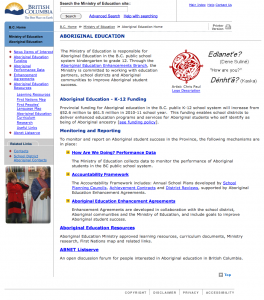Located on the Adams Lake Band reseve in the Sepwepemc Nation, BC, Chief Atahm School is a parent-run language immersion school and educational program. The program began in 1987 as a language nest modeled in the Maori style of “Te Kohanga Reo” by a group of parents hoping to stem the loss of the Sepwepemc language. Since that time, their program has grown into an internationally celebrated example of successful tribally controlled education. Their Vision Statement reflects a deep respect for the values and traditions of the Sepwepemc.
The school provides full immersion from nursery through grade three, partial immersion for grades four through nine, and adult language courses. As the success of their program has become evident through the students that progress through the school and the revitalization of the Sepwepemc language, they also provide yearly Teacher Training institutes and adaptable curriculum development tools. Building on a tradition of continuing refinement of their programming, Chief Atahm School holds an annual language conference that is well attended by language activists, teachers, and enthusiasts.
